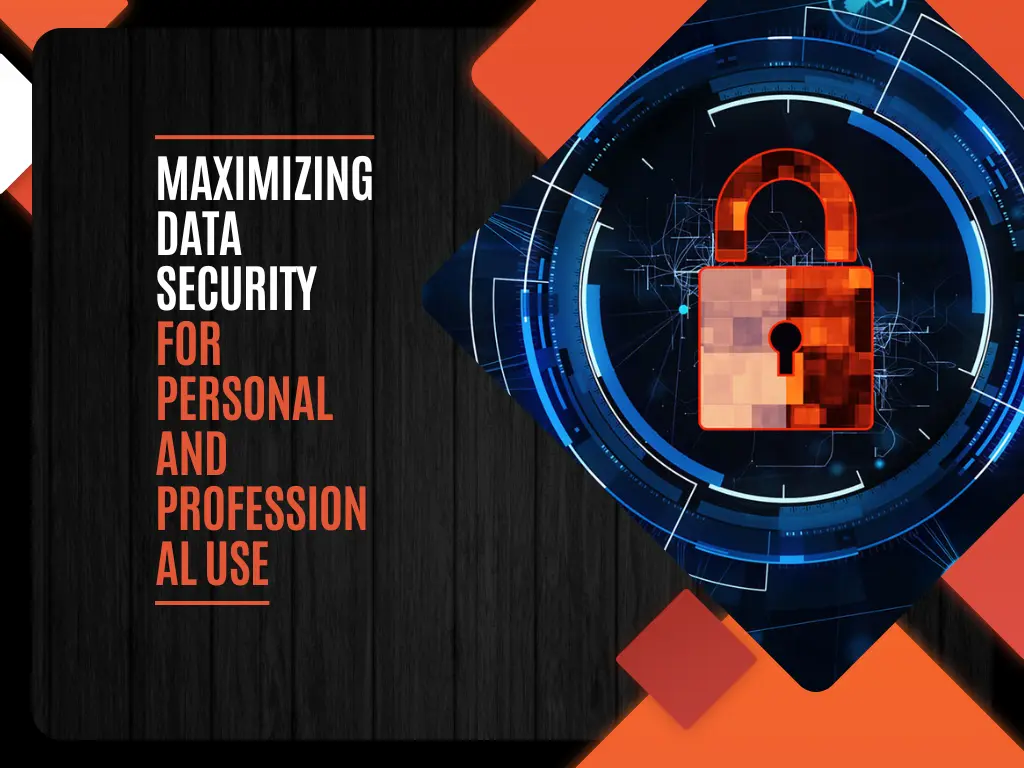Maximizing Data Security for Personal and Professional Use
Learn essential tips and strategies to enhance data security for both personal and professional use, safeguarding your sensitive information.

In an era where information is power, ensuring the security of data has become paramount for both individuals and organizations. The pervasive nature of digital technology has made data security not just a necessity but a cornerstone of trust and safety in societal interactions. Understanding and maximizing data security measures can prevent data breaches, identity theft, and substantial financial losses.
Understanding the Importance of Data Security
Data security involves the protective measures and frameworks that safeguard personal and professional information from unauthorized access and breaches. It encompasses various practices and technologies aimed at preventing data corruption, loss, or theft.
With the increasing reliance on digital platforms, both personal and professional data are constantly at risk. Cyber threats have evolved, becoming more sophisticated and frequent. Thus, having a robust data security framework is crucial for maintaining privacy and safeguarding sensitive information.
The Consequences of Neglecting Data Security
Failing to implement adequate data security measures can lead to dire consequences. Individuals may face identity theft, financial fraud, and the loss of sensitive personal information, while organizations may suffer data breaches that can damage reputation, legal liability, and financial stability.
Furthermore, neglecting data security can result in the loss of intellectual property and customer trust. For businesses, the aftermath of a data breach often involves expensive recovery processes and potential loss of clients, making it essential to prioritize data security.
The Role of Data Security in Today’s Digital Age
In today’s digital age, where remote work and online interactions have surged, the role of data security has become more critical than ever. Individuals and organizations must navigate a complex landscape of cyber threats, making it necessary to adopt comprehensive security measures.
The digital transformation of businesses has also contributed to the increasing volume of data being generated and shared, heightening the need for effective security strategies. The ability to protect sensitive information not only ensures operational integrity but also enhances customer confidence and loyalty.
Key Elements of Data Security
Maximizing data security involves understanding and implementing several key components that work together to create a robust security posture. These components range from technological tools to organizational policies designed to protect data integrity and confidentiality.
Encryption and Its Role in Data Security
Encryption is one of the most effective methods for safeguarding data. It involves converting readable data into a coded format, ensuring that only authorized users with the necessary decryption keys can access the information.
Utilizing encryption protects sensitive information during transmission and storage, making it significantly harder for cybercriminals to exploit. From personal emails to corporate databases, employing encryption is essential for maintaining data confidentiality.
The Importance of Regular Data Backups
Regular data backups serve as a safety net for both personal and business data. By creating copies of data at regular intervals, users can recover lost information due to accidental deletion, hardware failures, or cyberattacks. One increasingly popular method is online cloud backup, which allows users to store data securely in off-site servers, ensuring access to files from anywhere with an internet connection. Cloud backup not only simplifies the recovery process but also provides automatic backups, reducing the risk of data loss due to human error or unforeseen events.
Backing up data can be achieved through various methods, such as external hard drives, cloud storage solutions, and network-attached storage systems. The key to effective data backups is implementing a routine schedule and ensuring backups are secure and easily accessible when needed.
The Use of Strong, Unique Passwords
Strong, unique passwords are the first line of defense against unauthorized access to systems and accounts. It is essential to create passwords that are difficult to guess and to avoid using the same password across multiple accounts.
A good practice is to incorporate a mix of uppercase and lowercase letters, numbers, and special characters while ensuring passwords are at least 12 characters long. Additionally, utilizing password managers can help in securely storing and managing multiple passwords for various accounts.
Data Security for Personal Use
Individuals must be proactive in implementing data security measures to protect their personal information. This includes understanding potential risks and taking concrete steps to mitigate them.
Protecting Your Personal Information Online
To safeguard personal information online, individuals should be mindful of what they share on social media and other online platforms. Security settings should be adjusted to limit the visibility of shared data, and privacy policies should be reviewed to understand how personal data may be utilized by third parties.
Moreover, one should avoid sharing sensitive information, such as social security numbers and financial details, unless absolutely necessary. Being aware of phishing scams and fraudulent websites is another vital aspect of protecting personal data.
Safe Internet Browsing Practices
Safe internet browsing practices are essential for protecting personal data. Users should always look for HTTPS in the web address, indicating a secure connection. Avoiding public Wi-Fi for sensitive transactions is also crucial, as unsecured networks are prime targets for cyber intruders.
Implementing browser security features, such as ad blockers and privacy-focused extensions, can enhance online safety and reduce exposure to potential threats.
Mobile Device Security Measures
Mobile devices are often less secure than traditional computers, making it essential to adopt specific security measures. Enabling features like biometric authentication (fingerprint or facial recognition) adds an additional layer of protection.
Regular software updates are critical, as manufacturers release patches to address security vulnerabilities. Installing reputable security apps can also help protect against malware and unauthorized access to personal information stored on mobile devices.
Data Security for Professional Use
Organizations face unique challenges in data security due to the volume and sensitivity of the data they manage. Implementing comprehensive data security strategies is vital for protecting both company assets and employee information.
Implementing a Company-Wide Data Security Policy
A clear and comprehensive data security policy is essential for all organizations to ensure employees understand their roles in safeguarding sensitive information. Policies should outline acceptable use, data classification, and incident response procedures.
Regular assessments and updates to the policy should be made to accommodate evolving cyber threats and changing technology landscapes. It’s also important to communicate this policy effectively, ensuring all employees are trained on its contents.
Training Employees on Data Security Best Practices
Human error is often the weakest link in data security. Therefore, training employees on best practices is crucial. Topics should include recognizing phishing attempts, safe handling of sensitive information, and proper use of company devices.
Regular training sessions, workshops, and security drills can reinforce the importance of data security and keep security awareness top of mind for all employees.
The Role of Firewalls and Antivirus Software in Business
Firewalls and antivirus software are essential components of a robust data security framework for businesses. Firewalls serve as a barrier between trusted internal networks and untrusted external networks, monitoring and controlling incoming and outgoing network traffic. Antivirus software protects against malicious software, automatically scanning and removing potential threats. Both tools should be regularly updated to defend against the latest cyber threats effectively.
In conclusion, maximizing data security requires a multi-faceted approach tailored to both personal and professional environments. By understanding the importance of data security, implementing key measures, and fostering a culture of security awareness, individuals and organizations can significantly reduce the risk of data breaches and protect valuable information.



